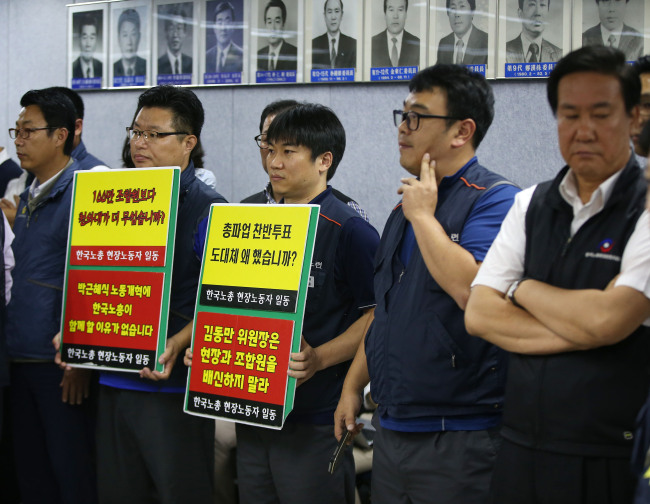The Seoul government is set to push for reforming the labor market following a deal reached at the trilateral committee on labor, business and government on Sunday, despite vehement opposition from some unionists and a grueling process ahead at the National Assembly.
 |
| Some members of the Federation of Korean Trade Unions stage a rally opposing the compromise reached on labor reforms during a cetral executive committee meeting Monday in Seoul. Yonhap |
The compromise came after months-long negotiations, with the trilateral committee agreeing on the broad picture of the labor market reforms and the labor bloc backing down from its initial stance.
But the panel left most of the major contentious decisions to the National Assembly, hinting that the reform plans still had a tough road ahead.
Though the government, the ruling Saenuri Party and businesses hailed the agreement as a breakthrough, some radical unionists under the Federation of Korea Trade Unions opposed the plan, casting a shadow over the prospects of a smooth implementation.
The FKTU held an executive meeting Monday to endorse the deal, which was strongly opposed by some of its members.
Some 100 union members rallied in protest at the umbrella union’s “compromise” with the government, holding up placards that read “We can never approve the agreement that enslaves 20 million laborers.”
The meeting was thrown into further disarray when Kim Man-je, head of its metal union, poured paint thinner onto his body and the floor at around 3:30 p.m. to express resistance. Another unionist near him reportedly stopped him from setting himself on fire with a fire extinguisher. As of 6 p.m., the union meeting resumed, but the officials were nowhere near reaching a conclusion, a source from the trade union said.
The labor and business blocs had locked horns over the employers’ call for reduced protection of workers.
According to the plan, the government will set up administrative guidelines designed to ease restrictions for employers to dismiss underperforming workers and change company rules without union approval.
In an apparent attempt to contain the labor circle’s concerns, the committee stipulated in the draft plan that the government should sufficiently consult with the labor and business blocs when employing measures to reform the labor market.
Until such guidelines are established, employers will refer to past court rulings to decide under what conditions employees can be dismissed and rules changed.
The plan would lay the groundwork for employers to push to change the employment contracts or salary system without union approval, giving a boost to expanding the government-backed wage peak system in the private sector.
The government pledged to offer financial and policy support to the companies adopting the system in the proposal, with the committee vowing efforts to use the money saved from the wage peak system to create jobs for the young.
Under the wage peak system, companies pay senior employees reduced salaries after the workers reach a certain age, generally between 55 and 60, in return for extending the retirement age. With the official retirement age set to rise by two years to 60 next year, the government has pushed for the revamp in the overall wage system.
Regardless of the FKTU’s approval, the government and the ruling Saenuri Party will likely forge ahead with attempts at market reforms. They held a consultative meeting to map out plans for legislation earlier in the day.
Lee Jang-woo, the spokesman for the ruling party, called the agreement “belated but extremely fortuitous.” Lee urged “active” participation from the opposition party.
The main opposition New Politics Alliance for Democracy, however, expressed regret, saying that there is still a long road ahead for the agreement.
The ruling party is set to submit the reform bill to the Assembly on Wednesday in a bid to pass it though the parliament within the upcoming regular session.
Led by the tripartite commission head Kim Dae-hwan, the top negotiators from each side — the FKTU head Kim, Korea Employer’s Federation head Park Byoung-won and the Labor Minister Lee Ki-kwon — have tried to draw a compromise on the reform plan since the labor union returned to the three-way dialogue in late August.
The negotiations faced a number of hurdles, with the trade union fiercely opposing the government’s plan to ease restrictions on dismissing underperforming workers and give companies more discretion to change their rules without union approval.
The talks among management, labor and government came in line with President Park Geun-hye’s campaign for labor market reforms, a top priority on her policy agendas in the second half of this year.
The government has vowed to implement the reforms within this year, even without workers’ approval, to inject flexibility in what it has called “rigid” labor market.
By Ock Hyun-ju (laeticia.ock@heraldcorp.com)

